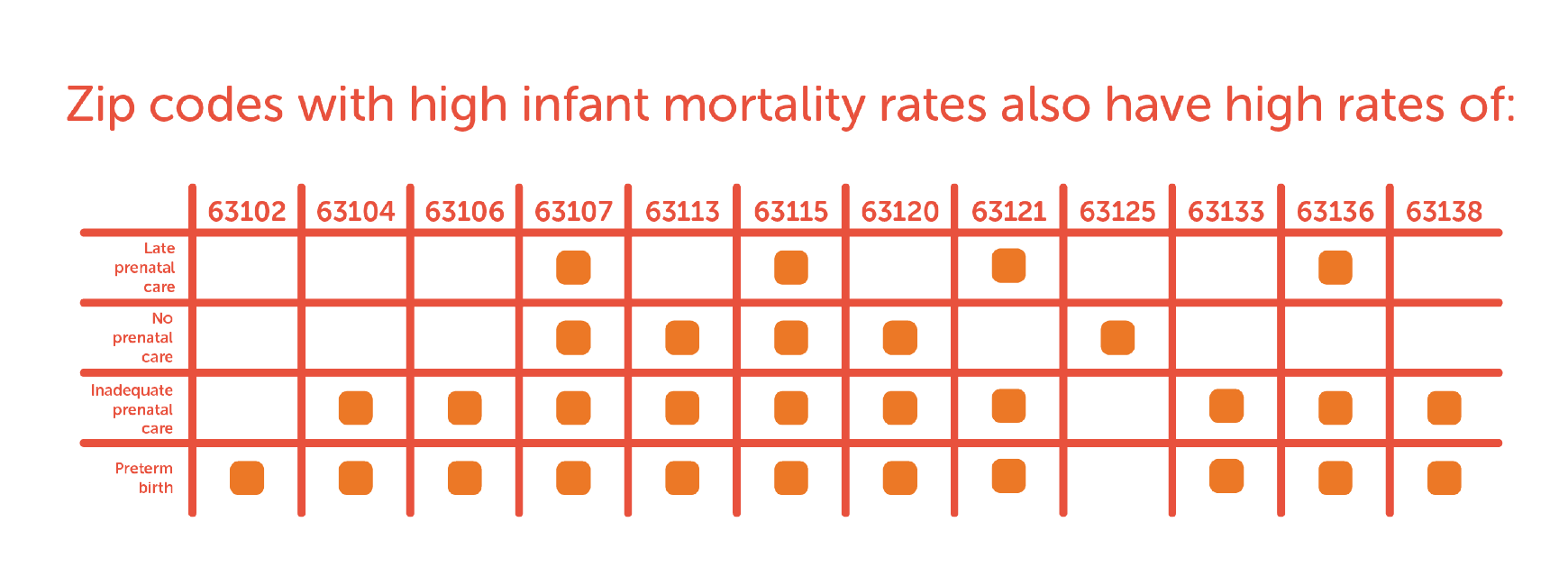Why Coordinated Quality Care Matters
Even though St. Louis is home to some of the best medical care in the country, some of our zip codes are facing infant mortality rates double and triple the national average. Moms living in many of the zip codes with the highest infant death rates also experience late, inadequate or no prenatal care during pregnancy, and an increased number of preterm births. Statistics show that moms who do not have access to prenatal care during pregnancy are three times more likely to have a low birth weight baby and five times more likely to have a baby that dies.
One in four Black women receive inadequate or late prenatal care, which puts themselves and their infants at risk. However, access to care does not equate to quality care, and many Black mothers experience service delivery models in healthcare that are dictated by assumptions, stereotypes and racial bias. These factors, along with lifelong experiences of stress due to racism, can create unsafe and life-threatening complications for Black mothers during and after childbirth.
Prenatal Care Challenges by Zip Code
Even though St. Louis is home to some of the best medical care in the country, some of our zip codes are facing infant mortality rates double and triple the national average. Many of the zip codes with the highest infant death rates also experience late, inadequate or no prenatal care during pregnancy, and an increased number of preterm births.
Statistics show that moms who do not have access to prenatal care during pregnancy are three times more likely to have a low birth weight baby and five times more likely to have a baby that dies. Here in St. Louis City and St. Louis County, one in five pregnant women receives inadequate prenatal care during pregnancy, or care that comes too late. And, there are great disparities in how Black women experience prenatal care: more than one third of Black women in the City of St. Louis receive inadequate prenatal care during pregnancy compared to White women.
What FLOURISH is Doing to Make a Difference
FLOURISH St. Louis is working to improve access to quality health care and coverage so that all Black moms in St. Louis city and county receive the quality care they need during pregnancy, childbirth and in the postpartum. This can best be accomplished by cross-sector partnerships and collaboration focused on:
- Designing prenatal care models with and for Black moms
- Improving Black moms’ access to quality, holistic health care services through community health workers, doulas, home visiting programs, and behavioral health programs for pregnant and postpartum parents
- Advocating for payment models to support these modes of care
- Aligning home visiting programs around feedback from community members.
In addition, we are advocating for changes to health care delivery, including: bringing prenatal care to communities in non-traditional settings, improving access to health insurance, and training health care professionals to understand how racial bias and trauma impact the quality and utilization of services.
To learn more about our approach to coordinated quality care or to share ideas with us, contact Lora Gulley at [email protected].





